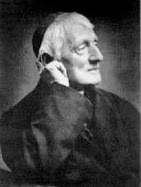 Today is the Memorial of Blessed Fr. Junipero Serra, the Franciscan missionary friar who founded many of the major missions in California, then a province of New Spain, in the 18th century, including San Luis Obispo, San Juan Capistrano, Santa Clara and San Carlos Boromeo in Carmel, CA, where he died and was laid to rest. He was beatified by Pope John Paul II in 1988. Although not in the best of health throughout much of his adult life, he traveled many thousands of miles, many of them on foot, in an effort to establish the Catholic faith in Mexico and what is now the Southwestern U.S.
Today is the Memorial of Blessed Fr. Junipero Serra, the Franciscan missionary friar who founded many of the major missions in California, then a province of New Spain, in the 18th century, including San Luis Obispo, San Juan Capistrano, Santa Clara and San Carlos Boromeo in Carmel, CA, where he died and was laid to rest. He was beatified by Pope John Paul II in 1988. Although not in the best of health throughout much of his adult life, he traveled many thousands of miles, many of them on foot, in an effort to establish the Catholic faith in Mexico and what is now the Southwestern U.S.Fr. Serra is the one for whom Serra International, whose mission is "to foster, affirm and promote vocations to ministry in the Catholic Church," is named. Most Catholics know this organization as their local "Serra Club" (not to be confused with the Sierra Club--please!)
One of the recent selections of my local book club was Willa Cather's Death Comes for the Archbishop
Father Junipero, he said, with a single companion, had once arrived at his monastery on foot, without provisions. The Brothers had welcomed the two in astonishment, believing it impossible that men could have crossed so great a stretch of desert in this naked fashion. The Superior questioned them as to whence they had come, and said the mission should not have allowed them to set off without a guide and without food. He marveled how they could have got through alive. But Father Junipero replied that they had fared very well, and had been most agreeably entertained by a poor Mexican family on the way. At this a muleteer, who was bringing in wood for the Brothers, began to laugh, and said there was no house for twelve leagues, nor anyone at all living in the sandy waste through which they had come; and the Brothers confirmed him in this.
Then Father Junipero and his companion related fully their adventure. They had set out with bread and water for one day. But on the second day they had been travelling since dawn across a cactus desert and had begun to lose heart when, near sunset, they espied in the distance three great cottonwood trees, very tall in the declining light. Toward these they hastened. As they approached the trees, which were large and green and were shedding cotton freely, they observed an ass tied to a dead trunk which stuck up out of the sand. Looking about for the owner of the ass, they came upon a little Mexican house with an oven by the door and strings of red peppers hanging on the wall. When they called aloud, a venerable Mexican, clad in sheepskins, came out and greeted them kindly, asking them to stay the night. Going in with him, they observed that all was neat and comely, and the wife, a young woman of beautiful countenance, was stirring porridge by the fire. Her child, scarcely more than an infant and with no garment but his little shirt, was on the floor beside her, playing with a pet lamb.
They found these people gentle, pious, and well-spoken. The husband said they were shepherds. The priests sat at their table and shared their supper, and afterward read the evening prayers. They had wished to question the host about the country, and about his mode of life and where he found pasture for his flock, but they were overcome by a great and sweet weariness, and taking each a sheepskin provided him, they lay down upon the floor and sank into deep sleep. When they awoke in the morning they found all as before, and food set upon the table, but the family were absent, even to the pet lamb,--having gone, the Fathers supposed, to care for their flock.
When the Brothers at the monastery heard this account they were amazed, declaring that there were indeed three cottonwood trees growing together in the desert, a well-known landmark; but that if a settler had come, he must have come very lately. So Father Junipero and Father Andrea, his companion, with some of the Brothers and the scoffing muleteer, went back into the wilderness to prove the matter. The three tall trees they found, shedding their cotton, and the dead trunk to which the ass had been tied.
But the ass was not there, nor any house, nor the oven by the door. Then the two Fathers sank down upon their knees in that blessed spot and kissed the earth, for they perceived what Family it was that had entertained them there.
Father Junipero confessed to the Brothers how from the moment he entered the house he had been strangely drawn to the child, and desired to take him in his arms, but that he kept near his mother. When the priest was reading the evening prayers the child sat upon the floor against his mother's knee, with the lamb in his lap, and the Father found it hard to keep his eyes upon his breviary. After prayers, when he bade his hosts good-night, he did indeed stoop over the little boy in blessing; and the child had lifted his hand, and with his tiny finger made the cross upon Father Junipero's forehead.






No comments:
Post a Comment